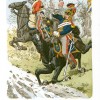Madeira
Madeira is an autonomous region of Portugal consisting of an archipelago in the Atlantic Ocean. Its capital is Funchal. It was developed as a hub of sugar production in the fifteenth century, and slave labor from Africa was used to cultivate the sugar cane. Madeira was occupied by British troops during the Napoleonic Wars. Funchal suffered German bombing during the First World War. Madeira was granted political autonomy in 1976. The area is famous for its Madeira wine.
Coordinates
Latitude: 32.745678468628
Longitude: -16.956825228408
Longitude: -16.956825228408


